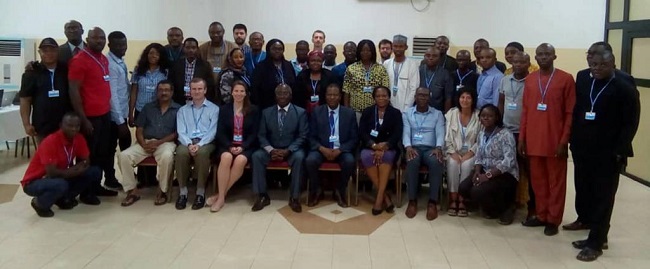Nigeria’s bid to prepare qualitative greenhouse gas (GHG) inventories has received a boost, thanks to a fatherly arm extended by the United Nations, whose bodies are collaborating in the landmark initiative.

At the International Greenhouse Gas (GHG) Inventory Quality Assurance Training for Nigeria organised by the United Nations Framework Convention on Climate Change (UNFCCC) Secretariat, in collaboration with the Food and Agriculture Organisation (FAO), United Nations Development Programme (UNDP) and United Nations Environment Programme (UNEP) Global Support Programme on National Communications and Biennial Update Report (BUR) held in Lagos from November 5 to 9, 2018, experts from various sectors were skilled on GHG inventory strategies.
In his opening remarks at the workshop, Director, Department of Climate Change (DCC) in the Federal Ministry of Environment, Dr Peter Tarfa, emphasised that there is a growing understanding that the response to climate change can only be effective if the knowledge of climate change is linked across all stakeholders.
Tarfa, who was represented by Mrs Iniobong Abiola-Awe, a Deputy Director in the DCC and National Coordinator, National GHG Inventory Management System, said: “Quality control in climate change reporting entails how we review the quality of all factors involved in the production of our national reporting. It is a good practice to document and archive all information required to produce the national emissions inventory estimates with all the quality checks at each level of preparation to such a way that the reported emissions estimates are transparent and steps in their calculation can be retraced.”
According to him, one of the goals of the Intergovernmental Panel on Climate Change (IPCC) on good practice guidance is to support the development of national GHG inventories that can be readily assessed in terms of readiness and completeness.
“It is a good practice to implement quality assurance procedures in the development of national GHG inventory to accomplish this goal. Understanding all the necessary check points to undertake quality assurance right from the process of data collection to report compilation is necessary. There is a great need to draw attention of all stakeholders and to disseminate knowledge, promote awareness and understanding of effective climate change knowledge reporting for national development.”
One of the trainers at the workshop, Rasack Nayamuth, said: “The training covers quality assurance and on how to compile, including the computerisation, of the GHG inventory. It is following last week’s training in Abuja that covered hands-on training for national experts on how to run the 2006 IPCC software, which is the methodology recommended by the Conference of the Parties of the UNFCCC to do inventories. All countries follow the same method so that it can be comparable over the years, over time and between countries.
“Nigeria is a signatory Party to the Convention (UNFCCC) and as such has obligations to report what it is achieving in terms of implementation of the Convention. The ultimate objective of the Convention is to stabilise the level of GHG in the atmosphere to eventually try to reduce global warming over a longer period which the IPCC is measuring.”
Manager, Mitigation and Transparency Support (Mitigation, data and Analysis) at the United Nations Climate Change Secretariat, William Agyemang-Bonsu, stressed that the benefit of the intervention is that it would reduce not only GHG, but also particulate matter or emissions which normally would have implications for human health in the urban centre.
“The goal is not only to do the technical work and let it rest there, the goal is to bring up the policy and inform development,” he said, adding that the nation should not only look at making the national system for GHG inventory an important foundation for measurement, reporting and verification, but at the same time lay a foundation for potential future work.”
